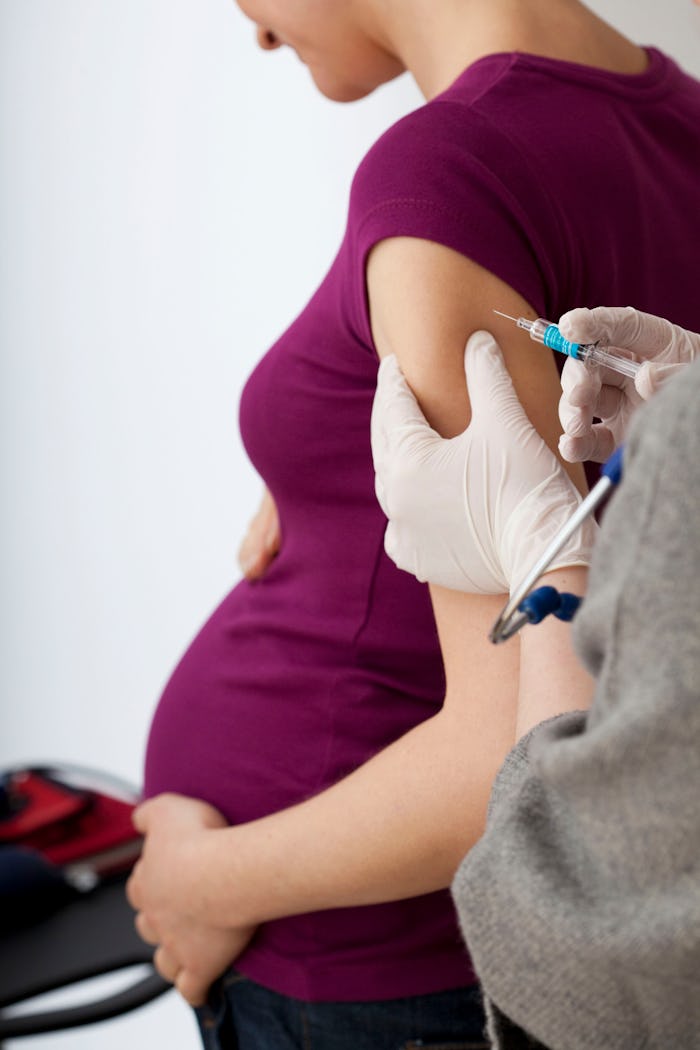Coronavirus

Pregnant Women In The U.S. Are More Hesitant To Get COVID-19 Vaccines, New Survey Finds
Pregnant women in India, the Philippines, and Latin American countries may be more accepting of COVID-19 vaccines than pregnant women in the United States.
Researchers at Harvard University have found pregnant women in the United States may be more hesitant about COVID-19 vaccines than moms-to-be living in other areas of the world. In a survey of women spread across 16 countries, researchers found COVID-19 vaccine acceptance was lowest among pregnant women in the United States, Russia, and Australia and highest among women in India, the Philippines, Brazil, and Mexico. As for why expectant mothers in the U.S. so hesitant, researchers say there's no one single answer.
"Our study confirmed that COVID-19 vaccine hesitancy is multifaceted," Julia Wu, a research scientist of infectious disease epidemiology at the Harvard T.H. Chan School of Public Health and the senior author of a survey published Monday in the European Journal of Epidemiology, said in a statement released by the university. "The perceived threat of COVID-19, level of trust in public health agencies, and existing pre-COVID 19 vaccine attitudes play key roles shaping vaccine acceptance and confidence. Vaccination campaigns should be tailored to alleviate these specific concerns."
In an effort to gauge global vaccine acceptance among pregnant women and mothers, Wu and her team surveyed 17,871 pregnant women and mothers of minor children living in 16 different countries. Overall, 52% of pregnant women and 73.4% of non-pregnant mothers surveyed said they intended to receive a COVID-19 vaccine. Additionally, 69.2% of all women surveyed said they intended to also vaccinate their children when they became eligible, indicating that, on a global scale at least, a majority of pregnant women and mothers are receptive to COVID-19 vaccines.
But when researchers filtered the survey results by country, they found pregnant women in some countries had noticeably lower rates of vaccine acceptance than others. In India and Mexico, for example, the level of COVID-19 vaccine acceptance among pregnant women was found to be higher than 80%. But in the United States, Australia, and Russia, the level of vaccine acceptance was below 45% despite guidance from the World Health Organization (WHO) noting pregnant people can get a COVID vaccine without experiencing specific risks that might outweigh the vaccine's benefits.
While researchers suggested the low level of vaccine acceptance in Australia could be a result of the country's low COVID-19 case numbers (at the time of the survey), they hypothesized a denial of COVID-19 and its seriousness could be behind low acceptance rates in the United States and Russia. However, it's not the only reason some pregnant women are hesitant to obtain a vaccine.
Wu's team reported the top reason pregnant women said they would turn down a "safe and free" COVID-19 vaccine was because they did not want to expose a developing baby to any possible harmful side effects. Other top reasons for avoiding a vaccine included concerns vaccine approvals had been rushed for political reasons and a desire for more data regarding vaccines' safety and effectiveness in pregnant people.
"The strongest predictors of vaccine acceptance included confidence in vaccine safety or effectiveness, worrying about COVID-19, belief in the importance of vaccines to their own country, compliance to mask guidelines, trust of public health agencies/health science, as well as attitudes towards routine vaccines," the report concluded.
In an effort to garner more data regarding the safety and effectiveness of COVID-19 vaccines in pregnant people, Pfizer and BioNTech enrolled more than 4,000 pregnant people in trials for its COVID-19 vaccine in February.
But until those results become available, Wu has suggested public health officials in countries with low levels of vaccine acceptance ensure their COVID-19 campaigns address pregnant women's specific concerns.
If you think you’re showing symptoms of coronavirus, which include fever, shortness of breath, and cough, call your doctor before going to get tested. If you’re anxious about the virus’s spread in your community, visit the CDC for up-to-date information and resources, or seek out mental health support. You can find all of Romper’s parents + coronavirus coverage here.